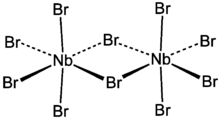Chemistry:Niobium(V) bromide

| |
| Names | |
|---|---|
| Other names
niobium pentabromide
| |
| Identifiers | |
| |
3D model (JSmol)
|
|
| ChemSpider | |
| EC Number |
|
PubChem CID
|
|
| |
| |
| Properties | |
| NbBr5 | |
| Molar mass | 492.430 g/mol |
| Appearance | wine red to black crystals |
| Density | 4.417 g/cm3 |
| Melting point | 254 °C (489 °F; 527 K) |
| Boiling point | 364 °C (687 °F; 637 K) |
| hydrolysis | |
| Structure | |
| orthorhombic | |
| Hazards | |
| Safety data sheet | MSDS |
| GHS pictograms |  
|
| GHS Signal word | Danger |
| H302, H312, H314, H332 | |
| P260, P261, P264, P270, P271, P280, P301+312, P301+330+331, P302+352, P303+361+353, P304+312, P304+340, P305+351+338, P310, P312, P321, P322, P330, P363, P405, P501 | |
Except where otherwise noted, data are given for materials in their standard state (at 25 °C [77 °F], 100 kPa). | |
| Infobox references | |
Niobium(V) bromide is the inorganic compound with the formula Nb2Br10. Its name comes from the compound's empirical formula, NbBr5.[2] It is a diamagnetic, orange solid that hydrolyses readily. The compound adopts an edge-shared bioctahedral structure, which means that two NbBr5 units are joined by a pair of bromide bridges. There is no bond between the Nb centres.[3] Niobium(V) chloride, niobium(V) iodide, tantalum(V) chloride, tantalum(V) bromide, and tantalum(V) iodide all share this structural motif.
Synthesis
Niobium(V) bromide can be prepared by the reaction of bromine with niobium metal at 230-250 °C in a tube furnace. It can also be produced from the more accessible oxide by metathesis using aluminium tribromide:[4]
- Nb2O5 + 3.3 AlBr3 → 2 NbBr5 + 3.3 Al2O3
A challenge with the latter method is the occurrence of NbOBr3 as an impurity.
References
- ↑ "Niobium(V) bromide" (in en). https://pubchem.ncbi.nlm.nih.gov/compound/83517#section=Safety-and-Hazards.
- ↑ Greenwood, N. N.; & Earnshaw, A. (1997). Chemistry of the Elements (2nd Edn.), Oxford: Butterworth-Heinemann. ISBN:0-7506-3365-4.
- ↑ Hönle, Wolfgang; Furuseth, Sigrid; Schnering, Hans Georg von (1990). "Synthesis and Crystal Structure of Ordered, Orthorhombic α-NbBr5". Zeitschrift für Naturforschung B 45 (7): 952–956. doi:10.1515/znb-1990-0706.
- ↑ G. Brauer (1963). "Niobium(V) and Tantalum(V) Bromides". in G. Brauer. Handbook of Preparative Inorganic Chemistry, 2nd Ed.. 1. NY, NY: Academic Press. pp. 1311.
External links
 |

